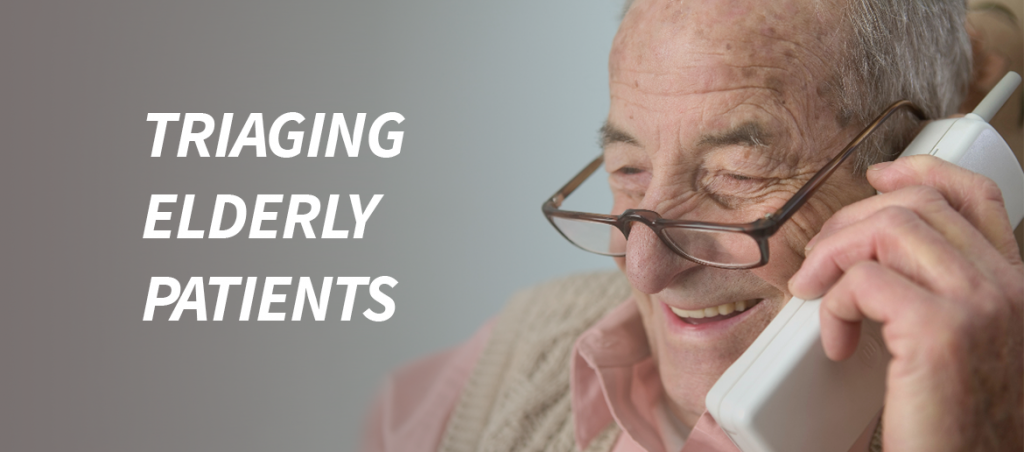Triaging Elderly Patients
By Nurse Manager, Marci Lawing, RN, BSN
Telephone triage nurses have an extra challenge when working with the elderly. Triage nurses are not able to see their patients, communicating via the telephone, and that can sometimes be less than ideal. Phone connection issues can make the conversation even more challenging. Along with the fact that the patient may be hard of hearing or not understand the new technology of getting advice from a medical professional over the phone.
The US Census Bureau estimates that by 2030 one in five Americans will be over 65 years of age. Today, people in this age group are the greatest consumers of healthcare services in the United States. Current estimates indicate that approximately 80% of people age 65 and older have at least one chronic illness, such as heart disease, diabetes, or arthritis, and that the number of older adults with multiple chronic illnesses is substantial. This is why it is crucial that telephone triage nurses know how to successfully triage an elderly patient and what obstacles they may face during the call.
The elderly may have trouble navigating the internet and many have tried and true “old-fashioned” home care remedies that has been working for years, but are no longer helpful. Often, the home treatment interacts with their prescribed medications. Many seniors have trouble remembering all of their medications, or the print on the prescription bottle may be too little to read. Adding to this list, the elderly are often on a fixed income, which means they are more reluctant to visit a doctor, emergency room, or urgent care, unless they have run out of other options.
With more people living independently well into their 80’s and 90’s, healthcare options must change to accommodate their needs. It is nurses that provide front-line care for older adults in many different settings, including primary care offices, hospitals, urgent care centers, and nursing homes or assisted living facilities. Society is beginning to realize that the solution to providing care to the elderly must include a team approach. Having a telephone triage nurse available for these patients means that they are able to discuss medical issues or concerns right away and not delay care.
Below is a summary of tips to remember about caring for the elderly, whether it is your family member or a patient.
Tips:
- Do not avoid those “hard to talk about” conversations. It can bring peace of mind to an elderly person to know their affairs are in order and their medical power of attorney is in place. In the middle of a medical emergency is the not right time to talk about these sensitive issues.
- Sometimes it takes a village. Elderly care can be very complex and might include the assistance of PT, OT, Meals on Wheels, pharmacies that deliver, and other programs along with nursing care.
- Learn from your patient. Many elderly patients have stories to tell and life lessons to share. Take the time to hear them out.
- Remember to support the caregiver also. Caregivers can be family members, neighbors, or friends that provide care to an individual who has an acute or chronic condition. This can include bathing, fixing meals, driving them to appointments, spending casual time talking to them, and making sure they get their medications on time, along with other tasks.
- Be Patient. The elderly may not be as fluent with the new technology as you are. They often have vision, hearing, and memory challenges. Instead of rushing through your triage, slow down and go at their pace. This may be a longer call, but it is worth it in the end!
Telephone nurse triage is an excellent resource to help keep elderly patients out of the hospital and on track with their medication and other therapies. Nurse triage is also capable of coordinating the team approach to healthcare by making follow-up calls for patients post discharge from the hospital to confirm they understand their discharge instructions and assess any symptoms they are concerned about. Meeting the needs and challenges of the elderly can be difficult over the phone, but an experienced triage nurse is the key to successfully getting the patient to the right level of care, at the right time, and by the right mode of transportation.
If your practice needs help managing patient calls, contact us at 855-734-4463 or email info@triagelogic.com.
What to Read Next : The Importance of the Influenza Vaccine for Seniors





